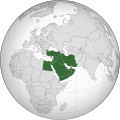Lebanese: Difference between revisions
CSV import |
No edit summary Tag: Manual revert |
||
| (2 intermediate revisions by the same user not shown) | |||
| Line 38: | Line 38: | ||
{{Levantine cuisine}} | {{Levantine cuisine}} | ||
{{Asia-stub}} | {{Asia-stub}} | ||
{{No image}} | |||
Latest revision as of 17:29, 18 March 2025
Lebanese refers to anything related to Lebanon, a country in the Middle East. This can include its people, culture, cuisine, and more.
People[edit]
The Lebanese people are the inhabitants of Lebanon and their descendants. They are primarily of Phoenician, Arab, and French descent due to the country's history of colonization and immigration. The Lebanese diaspora is significant, with communities in countries such as Brazil, Australia, and the United States.
Culture[edit]
Lebanese culture is a rich blend of various civilizations over thousands of years. It has been influenced by Phoenician, Hellenistic, Roman, Arab, Ottoman Turk, and French cultures. This is reflected in the country's architecture, music, literature, and cuisine.
Cuisine[edit]
Lebanese cuisine is a Levantine style of cooking that includes an abundance of whole grains, fruits, vegetables, and seafood. Chicken is eaten more often than red meat, and when red meat is eaten, it is usually lamb. It also includes copious amounts of garlic and olive oil.
Language[edit]
The official language is Arabic, but Lebanese Arabic, a variety of Levantine Arabic, is used in daily life. English and French are also widely spoken and taught in schools.
Religion[edit]
Lebanon has a diverse religious landscape. The main religions are Islam and Christianity, with significant communities of both Sunni and Shia Muslims, as well as Maronite Christians. There is also a small Druze community.
Geography[edit]
Lebanon is located in the Middle East, bordered by Syria to the north and east, and Israel to the south. It is known for its diverse landscapes, from the Mediterranean coast to the mountainous interior.
History[edit]
The history of Lebanon is long and complex, with the region being home to some of the oldest human settlements in the world. It has been part of numerous empires and civilizations, including the Phoenicians, Romans, and Ottomans.
| Arab world | ||||||||||
|---|---|---|---|---|---|---|---|---|---|---|
This Arab world related article is a stub.
|
| Levantine cuisine | ||||||||||
|---|---|---|---|---|---|---|---|---|---|---|
*
|

